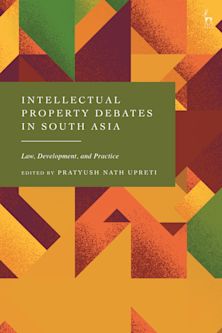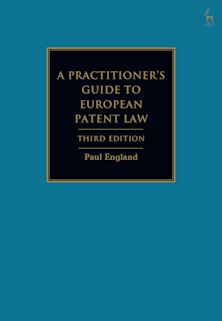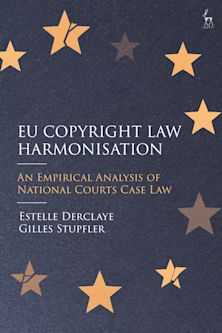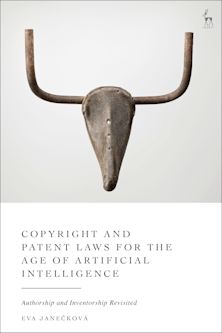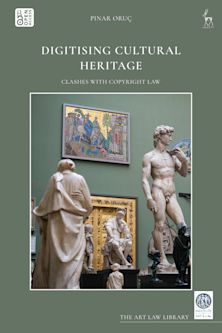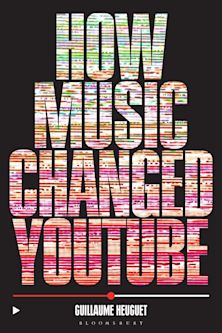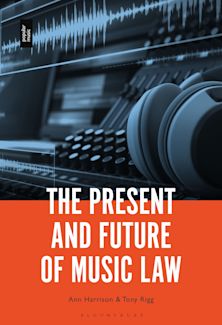- Home
- ACADEMIC
- Law
- Intellectual Property Law
- Copyright Law and the Public Interest in the Nineteenth Century
Copyright Law and the Public Interest in the Nineteenth Century
Copyright Law and the Public Interest in the Nineteenth Century
This product is usually dispatched within 1 week
- Delivery and returns info
-
Free US delivery on orders $35 or over
You must sign in to add this item to your wishlist. Please sign in or create an account
Description
Copyright law is commonly described as carrying out a balancing act between the interests of authors or owners and those of the public. While much academic work, both historical and contemporary, has been done on the authorship side of the equation, this book examines the notion of public interest, and the way that concepts of public interest and the rhetoric surrounding it have been involved in shaping the law of copyright. While many histories of copyright focus on the eighteenth century, this book's main concern is with the period after 1774. The nineteenth century was the period during which the boundaries of copyright, as we know it today, were drawn and ideas of “public interest” were integral to this process, but in different, and complex, ways. The book engages with this complexity by moving beyond debates about the appropriate duration of copyright, and considers the development of other important features of copyright law, such as the requirement of legal deposit, the principle that some works will not be subject to copyright protection on the grounds of public interest, and the law of infringement. While the focus of the book is on literary copyright, it also traces the expansion of copyright to cover new subject matters, such as music, dramatic works and lectures. The book concludes by examining the making of the 1911 Imperial Copyright Act – the statute upon which the law of copyright in Britain, and in all former British colonies, is based. The history traced in this book has considerable relevance to debates over the scope of copyright law in the present day; it emphasises the contingency and complexity of copyright law's development and current shape, as well as encouraging a critical approach to the justifications for copyright law.
Table of Contents
I. The Public Interest: Balances and Incentives
II. The Stories So Far . . .
III. Scope and Structure
2 Copyright before the Nineteenth Century
I. Pre-history of the Statute of Anne
II. The Statute Takes Shape
III. Charting the Boundaries of the Statute of Anne
IV. Unfinished Edges
3 Copyright, the Book Trade and the Reading Public
I. Co-operation and Corporatism in the Book Trade
II. The Battle over Legal Deposit
III. Books Contrary to the Public Interest
IV. Conclusion
4 Extension and Expansion
I. Copyright in the Spoken Word
II. The Copyright Act of 1842
III. Foreign Authors and the Case of Jefferys v Boosey
5 Examination and Internationalisation
I. The Royal Copyright Commission of 1878
II. The Rise of Interest Groups and the Interplay of Domestic and International Copyright
III. Conclusion
6 Infringement at Common Law: Drawing Copyright's Boundaries
I. Infringement in the Eighteenth Century
II. The Nineteenth Century
III. Infringement at the Century's End
7 The Making of the 1911 Imperial Copyright Act
I. The fin-de-siècle Years: Laying the Foundations
II. A Musical Interlude
III. The Imperial Copyright Act of 1911
8 Conclusion
Product details
| Published | Mar 03 2010 |
|---|---|
| Format | Hardback |
| Edition | 1st |
| Extent | 344 |
| ISBN | 9781841137865 |
| Imprint | Hart Publishing |
| Dimensions | 9 x 6 inches |
| Publisher | Bloomsbury Publishing |
About the contributors
Reviews
-
As the only book that focuses directly on the public interest in its historical context, Alexander's monograph is a welcome addition to the body of scholarship on the history of copyright law. This is especially so given that the book is very well researched and executed.
...her interpretations and reasoning are well supported. As a consequence, serious students and scholars of the history of copyright law – whether specialists or not – must now add Alexander's book to their reading list. I learned much from it.H. Tomas Gomez-Arostegui, The IP Law Book Review, Volume 2, Number 1
-
The book, in addition to being an essential read for the student of copyright history, also provides much food for thought to those interested in contemporary intellectual property debates.
Oren Bracha, Law and History Review, Volume 29/2
-
Alexander's work sets out to historicise and problematise the concept of the public interest within copyright discourse, while at the same time championing its continued relevance for contemporary policy and debate. In both respects Copyright Law and Public Interest in the Nineteenth Century can be considered a success.
Ronan Deazley, The Modern Law Review, 74 (3)
-
Alexander's book is descriptive, narrative legal history at its most readable and enjoyable…[it] may both be read in one sitting and employed for detailed reference later by legal historians, lawyers and students.
Regardless of one's perspective… this book will not disappoint. The original and secondary source materials Alexander draws upon, as well as her careful and yet entertaining distillation of meanings, indisputably makes her work a really worthwhile read. Indeed, this book could well become required reading for future counsel appearing before Australia's High Court, or elsewhere in the common law world.Louise Buckingham, Copyright Reporter, Volume 28, Number 4
-
This book is very interesting and well-researched in what it is: an insight into the notion of public interest in British copyright law of the nineteenth century.
...this book makes a significant contribution in the area.Irini Stamatoudi, The Law and Poltics Book Review
-
The book is, first and foremost, a much needed comprehensive survey of the development of British copyright law from the beginning of the nineteenth century until the 1911 Imperial Copyright Act.
The survey aspect of the book is an extremely valuable contribution in its own right. Some of the nineteenth-century landmarks of British copyright law were covered in other works before, but none of those other works presented a systematic and comprehensive account of the kind offered by Alexander.Oren Bracha, Texas Law Review, Volume 89

ONLINE RESOURCES
Bloomsbury Collections
This book is available on Bloomsbury Collections where your library has access.













